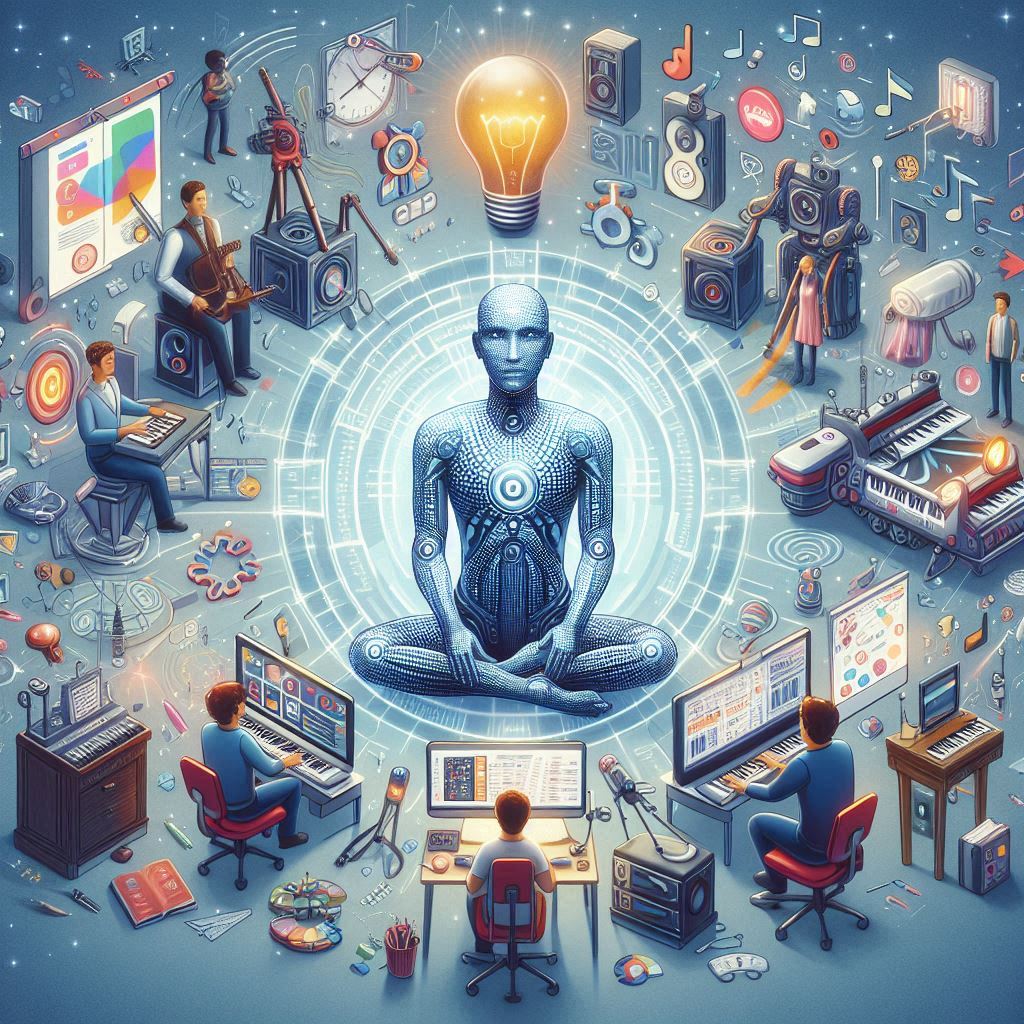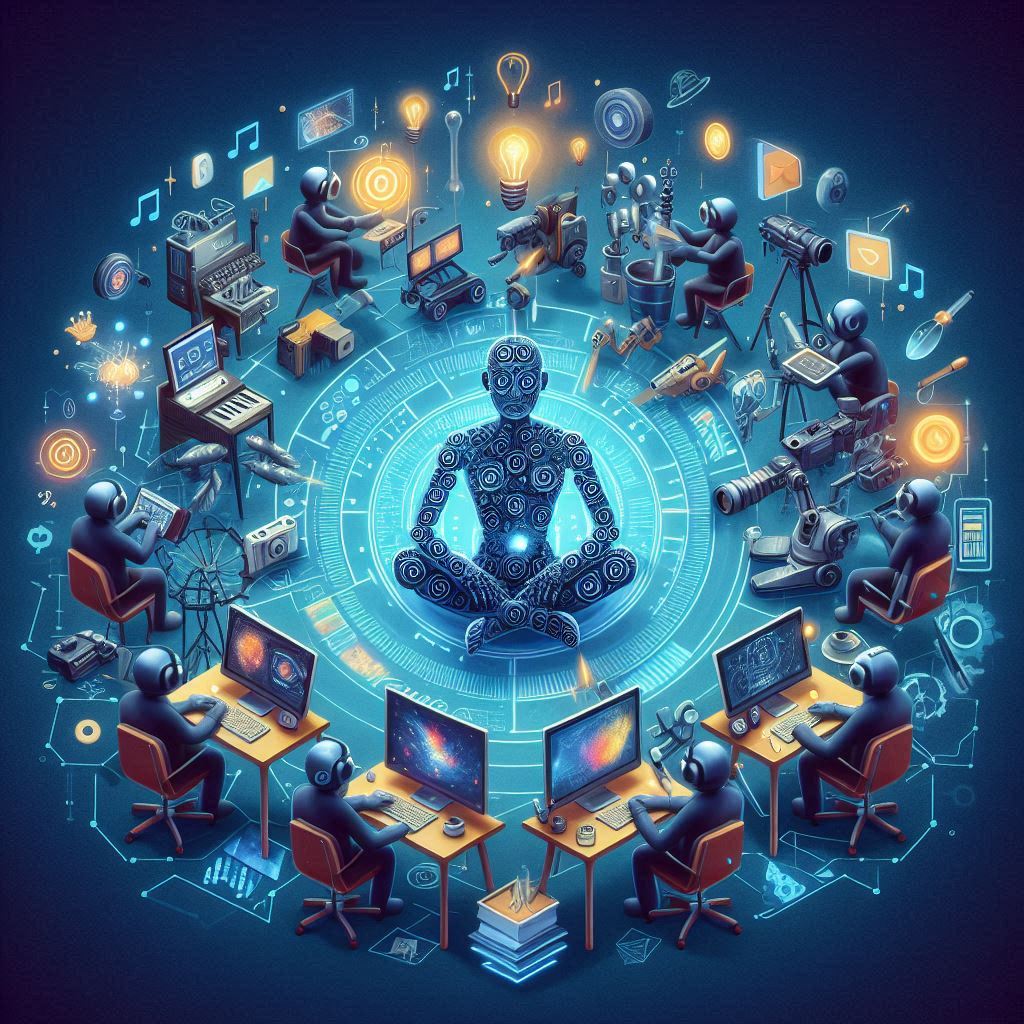The Evolution of AI in Entertainment: From Assistants to Creative Collaborators
Introduction to AI in Entertainment
Artificial Intelligence (AI) has evolved within the entertainment industry, transcending its initial role as a tool for automation and efficiency to becoming a pivotal force in creativity and audience engagement. This transformative journey showcases AI’s capacity to revolutionize how content is created, curated, and consumed across various entertainment sectors. From streamlining production workflows to enhancing user experiences through personalized recommendations, AI has reshaped industry norms and opened new frontiers for innovation.
This article delves deeper into the transformative impact of AI in entertainment, tracing its key milestones and exploring exemplary use cases that highlight its diverse applications. By examining AI-driven innovations across film, music, gaming, and digital media, we uncover how AI technologies have not only optimized operational efficiencies but also fostered unprecedented levels of creativity and interactivity. Looking ahead, we explore the future trajectory of AI in entertainment, envisioning its continued integration into creative processes and its potential to redefine the boundaries of audience engagement and storytelling.
Stay tuned as we embark on a journey through the dynamic intersection of AI and entertainment, where technological advancement meets artistic expression to shape the future of media and cultural experiences.
Success Stories and Exemplary Cases
AI has enabled significant advancements across various segments of entertainment. Companies like Disney, Netflix, and Spotify are leveraging AI to enhance user experience, content recommendation, and even creative production.
For instance, Netflix employs AI algorithms not only for personalized content recommendations but also in optimizing streaming quality based on network conditions and user preferences. Disney utilizes AI in its theme parks for predictive analytics to manage crowd flow and enhance visitor experience seamlessly.
Another compelling example is Spotify’s use of AI to curate playlists tailored to individual music tastes, utilizing machine learning to analyze listening habits and predict new music discoveries.

AI Applications in Entertainment
The applications of AI in entertainment are diverse and continuously expanding. Below is a detailed look at some key areas:
| Application | Description |
|---|---|
| Content Recommendation | AI algorithms analyze user preferences to suggest personalized content, enhancing user engagement and retention. |
| Virtual Assistants | AI-powered assistants provide interactive experiences and customer support, improving service efficiency. |
| Creative AI | AI tools assist in music composition, scriptwriting, and visual effects creation, augmenting human creativity. |
| Predictive Analytics | AI predicts audience preferences and box office success, optimizing marketing strategies and content production. |
Future Trends and Innovations
The future of AI in entertainment holds immense promise, driven by advancements in deep learning, natural language processing, and virtual reality integration. These technologies are poised to redefine how content is created, consumed, and experienced:
- Enhanced Personalization: AI will further refine personalized recommendations, offering tailored experiences across diverse entertainment platforms.
- Immersive Experiences: Virtual reality (VR) powered by AI will enable hyper-realistic simulations and interactive storytelling, blurring the lines between fiction and reality.
- Real-time Content Creation: AI-driven tools will assist artists and creators in real-time, from conceptualization to production, revolutionizing creative workflows.
Ethical Considerations and Challenges
However, the integration of AI in entertainment also raises significant ethical concerns and challenges:
- Data Privacy: AI relies heavily on user data, raising concerns about data privacy and security breaches.
- Bias and Representation: AI algorithms can perpetuate biases in content recommendations and portrayals, influencing societal perceptions.
- Impact on Creativity:While AI enhances productivity, there is a debate on whether it could diminish human creativity and originality in artistic endeavors.
Conclusion
In conclusion, AI’s evolution in entertainment signifies a paradigm shift from mere automation to transformative creativity. As AI technologies continue to advance, their integration into entertainment promises to deliver more personalized, immersive, and innovative experiences for global audiences. However, addressing ethical considerations and leveraging AI responsibly will be essential to harnessing its full potential while safeguarding the values of creativity and human expression
Pros and Cons of AI in Entertainment
Introduction
Artificial Intelligence (AI) has revolutionized the entertainment industry, offering unprecedented opportunities alongside significant challenges. This article explores the advantages and disadvantages of AI applications in entertainment, highlighting key aspects that shape its impact on creativity, user experience, and industry dynamics.
Pros of AI in Entertainment
- Enhanced Personalization: AI enables personalized content recommendations and experiences tailored to individual preferences, enhancing user satisfaction and engagement.
- Efficiency and Automation: AI streamlines production workflows, from content creation to distribution, reducing costs and improving operational efficiency.
- Creative Assistance: AI tools assist artists and creators in generating ideas, improving artistic workflows, and pushing the boundaries of creativity.
- Predictive Analytics: AI predicts audience behaviors and trends, optimizing marketing strategies and content development for better audience reach and profitability.
- Innovation in User Interfaces: AI-powered virtual assistants and chatbots provide interactive and intuitive user interfaces, enhancing user interaction and satisfaction.
Cons of AI in Entertainment
- Data Privacy Concerns: AI relies heavily on user data, raising significant privacy and security concerns regarding data collection, storage, and usage.
- Bias and Representation Issues: AI algorithms may perpetuate biases in content recommendations and portrayals, potentially reinforcing stereotypes and societal inequalities.
- Impact on Human Creativity: There is a debate over whether AI-assisted creative processes enhance or diminish human creativity, raising concerns about originality and artistic integrity.
- Dependency and Job Displacement: The automation capabilities of AI may lead to job displacement in traditional entertainment roles, impacting employment dynamics within the industry.
- Ethical Dilemmas: AI raises complex ethical dilemmas, including issues of accountability, transparency in decision-making, and the ethical implications of AI-generated content.
Balancing Innovation with Responsibility
Navigating the pros and cons of AI in entertainment requires a balanced approach that harnesses its transformative potential while addressing its ethical and societal impacts. As technology continues to evolve, stakeholders must collaborate to ensure responsible AI deployment that prioritizes creativity, user welfare, and ethical standards.
Conclusion
In conclusion, AI’s integration into entertainment represents a double-edged sword of innovation and challenges. By understanding and mitigating the risks associated with AI while maximizing its benefits, the entertainment industry can pave the way for a future where AI enhances creativity, engagement, and entertainment experiences in a responsible and sustainable manner.
This outline covers the key aspects of the pros and cons of AI in entertainment, structured to expand into an article of approximately 1000 words. Let me know if you need further details or adjustments!
FAQs: AI in Entertainment
1. What is Artificial Intelligence (AI) in the context of entertainment?
Artificial Intelligence (AI) refers to the simulation of human intelligence in machines that are programmed to think and learn like humans. In entertainment, AI is utilized to enhance various aspects such as content creation, personalization, user interaction, and predictive analytics.
2. How is AI used in content creation and production?
AI tools are increasingly used in content creation across entertainment sectors. For example, in film and television, AI can assist in scriptwriting, video editing, and even generating visual effects. In music, AI algorithms can compose melodies and assist in mixing and mastering tracks.
3. What are some examples of AI applications in streaming platforms?
Streaming platforms like Netflix and Spotify utilize AI to personalize user experiences. Netflix uses AI algorithms to recommend movies and TV shows based on viewing history and preferences. Spotify employs AI for personalized music recommendations and curated playlists tailored to individual listening habits.
4. How does AI enhance user interaction in entertainment?
AI-powered virtual assistants and chatbots enhance user interaction by providing personalized responses, recommendations, and customer support. These AI systems simulate human-like interactions, improving user satisfaction and engagement.
5. What are the benefits of AI in enhancing audience engagement?
AI enhances audience engagement by predicting user preferences and behaviors. This allows entertainment companies to tailor content, marketing strategies, and interactive experiences to maximize viewer engagement and satisfaction.
6. What are the ethical concerns surrounding AI in entertainment?
Ethical concerns include issues such as data privacy, bias in content recommendations, and the potential impact on creative autonomy. AI algorithms may inadvertently perpetuate biases or infringe on user privacy rights, prompting calls for transparency, accountability, and responsible AI deployment in entertainment.
7. How does AI influence the future of entertainment?
AI is poised to revolutionize the future of entertainment by enabling more personalized, immersive, and interactive experiences. Innovations in AI-driven technologies such as virtual reality (VR), augmented reality (AR), and machine learning algorithms promise to redefine how content is created, consumed, and experienced globally.
8. What are the potential drawbacks of AI adoption in entertainment?
Drawbacks include concerns over job displacement due to automation, the risk of over-reliance on AI for creative decision-making, and the ethical dilemmas surrounding AI-generated content and user data handling. Balancing technological innovation with ethical considerations remains a critical challenge for the entertainment industry.
9. How can stakeholders ensure responsible AI deployment in entertainment?
Stakeholders can ensure responsible AI deployment by prioritizing transparency, accountability, and fairness in AI algorithms. Implementing robust data privacy measures, fostering diversity in AI development teams, and engaging in continuous ethical reviews are essential steps toward ensuring that AI benefits are maximized while minimizing potential risks.
10. What are the future trends in AI and entertainment?
Future trends include advancements in AI-driven content creation, personalized virtual reality experiences, real-time audience analytics, and the integration of AI with emerging technologies like blockchain for content distribution and monetization. These trends are expected to shape the next generation of entertainment experiences globally.
Conclusion
In conclusion, AI’s role in entertainment presents a spectrum of opportunities and challenges. By addressing ethical concerns, leveraging AI for innovation, and fostering collaboration across sectors, the entertainment industry can harness the transformative power of AI to create compelling, personalized, and responsible entertainment experiences for audiences worldwide.
This structure covers a wide range of commonly asked questions about AI in entertainment, providing detailed insights into its applications, benefits, challenges, ethical considerations, and future implications. Let me know if you need further elaboration or adjustments!
Disclaimer and Caution: AI in Entertainment
Introduction
As artificial intelligence (AI) continues to integrate deeper into the entertainment industry, it brings with it transformative opportunities alongside significant challenges and considerations. This disclaimer and cautionary section aims to highlight the potential risks, ethical dilemmas, and responsible practices associated with AI adoption in entertainment.
1. Potential Risks of AI in Entertainment
While AI offers immense potential, it also poses certain risks that stakeholders in the entertainment industry should be mindful of:


[…] revolutionizing these industries, enhancing creativity, efficiency, and viewer engagement. As the entertainment industry evolves, the integration of AI continues to open new possibilities, bringing about significant […]
[…] roles traditionally performed by humans, leading to job insecurity and economic implications for the entertainment […]